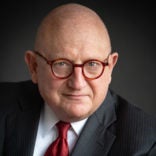As someone who spent the last four years following international anti-Semitism as the State Department’s special envoy to monitor and combat anti-Semitism, and who believes that 21st-century America has been largely immune to this disease, the neo-Nazi/Klan/white supremacist assault on Charlottesville is a wake-up call.
Like most Americans I ask myself, “What is happening to America in 2017?” But as an American Jew I keep returning to two other questions: “Is European-style anti-Semitism happening here?” and if so, “What is to be done?”
The more one reads about the history of anti-Semitism, the harder it is to argue that any country is forever immune to pervasive anti-Semitism. Nonetheless, most contemporary Americans have a hard time imagining that the United States would ever tolerate the persecution of religious minorities that characterizes much of the Middle East today, let alone the death and destruction that Jewish communities faced in 20th-century Europe.
“This is no time for complacency.”
In the course of meeting with dozens of international Jewish communities in the last couple of years, it was apparent to me that global anti-Semitism is on the rise. I have been telling myself that it can happen anywhere. I have been reminding myself of the stories my parents told me of a pre-WWII America, where Jewish admission quotas were the norm at elite undergraduate and professional schools, where certain jobs and professions were not open to Jews and where the nation’s most prominent business leader, Henry Ford, published “The International Jew” pamphlets. Yet like most American Jews who grew up in the last half-century, for me raw anti-Semitism was a phenomenon you only confront in a history book.
But we can’t ignore the images out of Charlottesville.
We’ve seen torch-carrying white supremacists screaming, “Jews will not replace us,” self-described fascists ranting about the Jews’ control of the world, anti-government militiamen outside a crowded Shabbat service brandishing semi-automatic weapons, and a call on Nazi websites to burn down the Charlottesville synagogue.
How different are these scenes than those that French Jews have faced when huge crowds marched through Paris shouting, “Jews — France does not belong to you.”
In the final analysis, looking at survey data, assessing levels of violence and assessing the mainstream political culture, I still believe that the U.S. is different than the rest of the world when it comes to virulent anti-Semitism. I am not thinking of packing my bags. Yet, things can change quickly — perhaps they are already beginning to change — and this is no time for complacency.
So what is to be done? First, we must acknowledge that we don’t have any silver bullets. We know that education is part of the answer to bigotry, but we don’t know what kind of educational programs are the most effective. We know that social media, with all its benefits, has provided the racists and the anti-Semites a means of efficiently spreading their hate, but we don’t yet have proven tools to push back. And the full answer is not simply to rely on the social media companies to take down Twitter accounts and shut down Facebook pages.
Ultimately, none of us can afford to wait for others to lead. All of us are responsible for publicly renouncing the haters.
In the United States we have one proven tool that no other democracy has effectively deployed. We have developed a robust civil society that can mobilize to publicly denounce the haters and support the victims of hate. When bigots spout their filth, communities can rise as one to name, shame and ostracize from civilized society the racists and the anti-Semites. Some years ago, when anti-Semites threw a cinder block through the window of the home of a young boy who displayed a menorah in Billings, Mont., the town organized itself to place menorahs in everyone’s window. In that way, community leadership sent a clear message: not in our town.
It starts at the top. It’s best when the president is the leading critic of the intolerant. However, even when the president does not lead, other political leaders — business and labor, clergy, nonprofit leadership — can step up. Ultimately, none of us can afford to wait for others to lead. All of us are responsible for publicly renouncing the haters.
A young Jewish community leader in France said it best in a meeting with U.S. diplomats in the fall of 2014. In the wake of violence directed at Jewish communities, he pointed out that the French government had been very supportive of his community. However, he went on to say, “ultimately it’s about civil society. If French society doesn’t act and speak out to support us, our future is bleak. But it’s really not about us. This is about the very values of the French Republic. We may be the first community to suffer from society’s silence. But we won’t be the last.”
Ultimately, Charlottesville is about American values. Are we up to the task?
Ira Forman served as the State Department’s special envoy to monitor and combat anti-Semitism from 2013 to 2017. This fall he is a visiting professor at Georgetown University, where he will teach a course on combating contemporary anti-Semitism.
The New York Jewish Week brings you the stories behind the headlines, keeping you connected to Jewish life in New York. Help sustain the reporting you trust by donating today.





